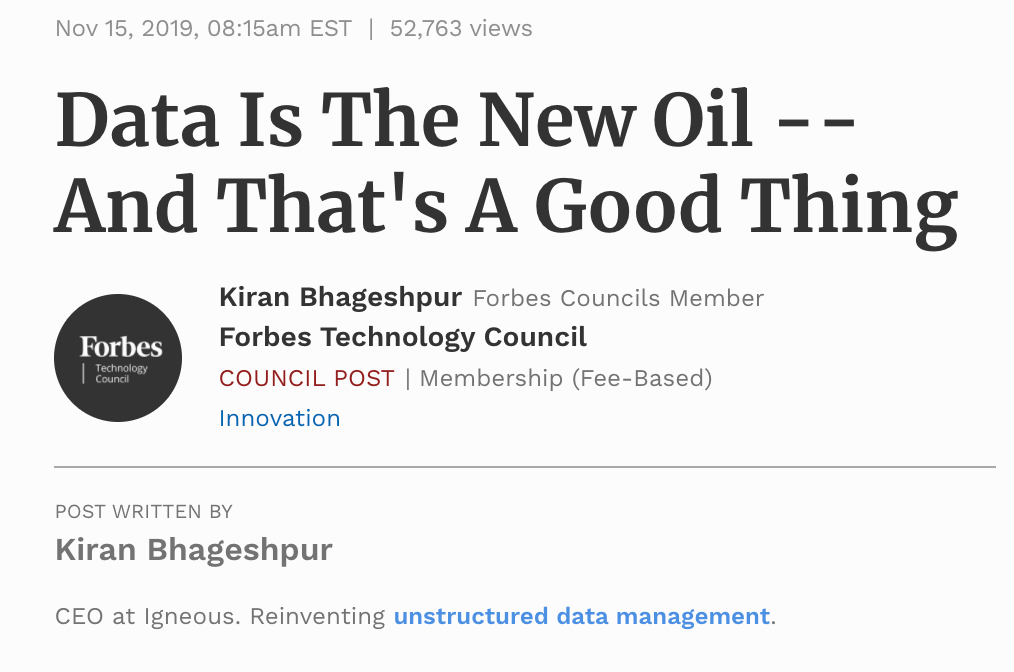In 2017, The Economist declared data is the new oil.
Within a year, WIRED had a more pessimistic look, No, data is not the new oil.
Forbes had a slightly optimistic take.
So what is it then? Is data oil or not? Kate Crawford in Atlas of AI referred to such metaphors:
Terms like “data mining” and phrases like “data is the new oil” were part of a rhetorical move that shifted the notion of data away from something personal, intimate, or subject to individual ownership and control toward something more inert and nonhuman. Data began to be described as a resource to be consumed, a flow to be controlled, or an investment to be harnessed. The expression “data as oil” became commonplace, although it suggested a picture of data as a crude material for extraction, it was rarely used to emphasize the costs of the oil and mining industries: indentured labor, geopolitical conflicts, depletion of resources, and consequences stretching beyond human timescales (p. 113).
Others have also looked into these data metaphors. There’s a paper entitled Data Is the New What? Popular Metaphors & Professional Ethics in Emerging Data Culture that goes into more detail. The article highlights two prominent modes of metaphor — data as a natural force to be controlled and data as a resource to be consumed1:
…data are analogized to “food and fuel,” staple materials which “must be
consumed to exist and to move forward rather than being consciously used.” As a force of nature, the authors observe data are often described as being in a liquid
state: “allusion to water [or oil]” they write, “supports the notion that data
is all at once essential, valuable, difficult to control, and ubiquitous.” From data
lakes, rivers, and oceans to data floods, deluges, and tsunamis, these metaphors
position data as something massive and volatile while also necessary to support
human life. As Deborah Lupton notes, however, liquid metaphors also tacitly
work to forestall ethical or regulatory interventions by positioning data as ubiquitous, uncontrollable, and resistant to transparency or accountability.
We even see a more pessimistic take by Martin Tisné:
Data isn’t the new oil, it’s the new CO2. It’s a common trope in the data/tech field to say that “data is the new oil”. The basic idea being – it’s a new resource that is being extracted, it is valuable, and is a raw product that fuels other industries. But it also implies that data is inherently valuable in and of itself and that “my data” is valuable, a resource that I really should tap in to.
In reality, we are more impacted by other people’s data (with whom we are grouped) than we are by data about us. As I have written in the MIT Technology Review - “even if you deny consent to ‘your’ data being used, an organisation can use data about other people to make statistical extrapolations that affect you.” We are bound by other people’s consent. Our own consent (or lack thereof) is becoming increasingly irrelevant. We won’t solve the societal problems pervasive data surveillance is causing by rushing through online consent forms. If you see data as CO2, it becomes clearer that its impacts are societal not solely individual. My neighbour’s car emissions, the emissions from a factory on a different continent, impact me more than my own emissions or lack thereof. This isn’t to abdicate individual responsibility or harm. It’s adding a new lens that we too often miss entirely.
The bottom line is that the way we use these metaphors hides the complexity. And the metaphors that are in circulation do not help us (who is this us? complicated question: scholars, activists, consumers?) highlight the social issues. For example, Dennis D Hirsch ( a legal scholar), takes the oil metaphor one step further, in particular, about Big Data. If Big Data is Oil, then what is analogous to oil pollution? This is from a 2014 article:2
Oil certainly has many productive uses, but it also leads to oil pollution. Big Data is similar. It produces tremendous benefits, but simultaneously generates significant privacy injuries. As the data sets get larger, the threat grows as well. Big Data is like a massive oil tanker navigating the shoals of hackers, criminals and human error. It can make us smarter and wealthier and our lives better. However, like oil, it can also harm us. Environmental law has developed ways to reduce oil pollution.
It is time to admit the madness and say just data is the new data and leave it at that. We need to work on frameworks and powerful linguistic tools to articulate complicated societal issues around data. Metaphors have certain powers but they have run their course.
Luke Stark and Anna Lauren Hoffmann, “Data Is the New What? Popular Metaphors & Professional Ethics in Emerging Data Culture,” Journal of Cultural Analytics. May 2, 2019.
Hirsch, D.D., 2013. The glass house effect: Big Data, the new oil, and the power of analogy. Me. L. Rev., 66, p.373. https://heinonline.org/HOL/P?h=hein.journals/maine66&i=391





This is a fair-minded and thoughtful essay. I learned two things here: Big Data will know a lot about me even if I consent to nothing. Also, I’m going to hold to the “data is the new oil” metaphor. As oil drove the industrial revolution, so data is driving so much industry today, also for good and for bad.